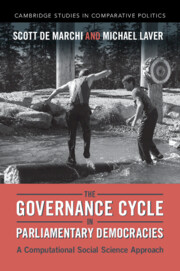Refine search
Actions for selected content:
10 results
7 - Political Transactions
-
- Book:
- Politics as Exchange
- Published online:
- 23 October 2025
- Print publication:
- 06 November 2025, pp 105-126
-
- Chapter
- Export citation
1 - The Political Marketplace
-
- Book:
- Politics as Exchange
- Published online:
- 23 October 2025
- Print publication:
- 06 November 2025, pp 1-13
-
- Chapter
- Export citation

Politics as Exchange
- An Analysis of the Political Marketplace
-
- Published online:
- 23 October 2025
- Print publication:
- 06 November 2025
3 - An Agent-Based Model of Government Formation and Survival
-
- Book:
- The Governance Cycle in Parliamentary Democracies
- Published online:
- 02 February 2023
- Print publication:
- 09 February 2023, pp 60-82
-
- Chapter
- Export citation
Introduction
-
- Book:
- The Governance Cycle in Parliamentary Democracies
- Published online:
- 02 February 2023
- Print publication:
- 09 February 2023, pp 1-8
-
- Chapter
- Export citation
2 - The Governance Cycle
-
- Book:
- The Governance Cycle in Parliamentary Democracies
- Published online:
- 02 February 2023
- Print publication:
- 09 February 2023, pp 36-59
-
- Chapter
- Export citation
7 - Conclusions and Aspirations
-
- Book:
- The Governance Cycle in Parliamentary Democracies
- Published online:
- 02 February 2023
- Print publication:
- 09 February 2023, pp 142-154
-
- Chapter
- Export citation
1 - Governance, Complexity, Computation, and Rationality
-
- Book:
- The Governance Cycle in Parliamentary Democracies
- Published online:
- 02 February 2023
- Print publication:
- 09 February 2023, pp 9-35
-
- Chapter
- Export citation

The Governance Cycle in Parliamentary Democracies
- A Computational Social Science Approach
-
- Published online:
- 02 February 2023
- Print publication:
- 09 February 2023
“Logrolling” in Antarctic governance: Limits and opportunities
-
- Journal:
- Polar Record / Volume 56 / 2020
- Published online by Cambridge University Press:
- 02 December 2020, e34
-
- Article
-
- You have access
- Open access
- HTML
- Export citation
